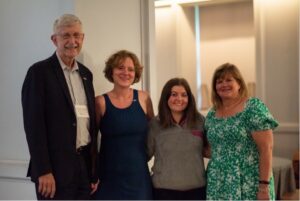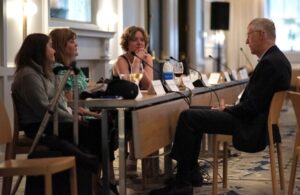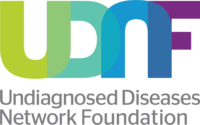05 Oct Meeting Francis Collins
By Stephanie Tomlinson | October 5, 2022
During the last week of June, the UDN-PEER members had the incredible privilege of participating in the annual Steering Committee meeting. This opportunity allowed us to meet with all 12 UDN sites; and the “brains and hearts” that drive this network of curious researchers. I was one of the PEER members who shared our family’s story and how the UDN has supported our need for a diagnosis for our son. For 90 minutes, three others shared their experiences and compared notes on living with an undiagnosed illness. At times, the emotions were very much on the surface. We spoke about our hatred of feeling like we are constantly up against the clock and controlled by funding.
At the end of our meeting, during a reception to thank everyone for their participation, we had the tremendous pleasure of meeting Dr. Francis Collins and Max Bronstein. Dr. Collins is a physician-geneticist and served as the National Institute of Health director for 12 years. His current assignment is to be the Science Advisor to the President. He reports directly to President Joe Biden. Dr. Collins was so gracious in sharing his heartfelt appreciation for the work that the UDN is doing and that PEER was able to speak personally about how the program is changing lives. He was attentive and told our small group of 5 about his vision for ARHPA and how we need to inspire people to believe in science again in today’s world. He encouraged us to keep telling our story and promote the necessity of more profound investigational medicine.
Along with Dr. Collins, we were introduced to the Assistant Director for Health Innovation at the White House Office of Science and Technology Policy, Max Bronstein. It was our discussion with Bronstein where the conversation turned to the emotional need we feel to educate our congressional members on the absolute necessity of keeping the UDN a viable program. It was truly inspiring to hear that our efforts and participation in the UDN as families were recognized and valued. Bronstein also encouraged us to keep working with organizations like EveryLife and find ways to be at the policy-making table whenever possible.
I knew attending this once-in-a-lifetime opportunity would be something I would think back on, and now I could say the quiet parts out loud and be heard and revered. I was more than Ted’s mom that day. So many times, rare patients and their families feel like sheep being led to the next great thing, the next test, because we continuously believe that hope is on the horizon, and we can’t turn back. Dr. Collins and Max reinforced my desire to dig in a bit deeper and be more vulnerable and encouraged me to keep asking for what we want, a diagnosis, support, and to be recognized as contributors to the advancement of medical care in our country.





